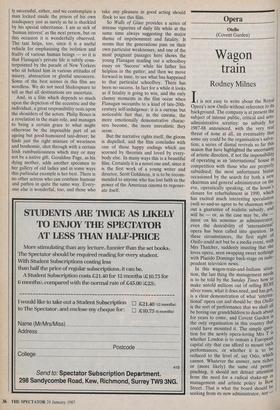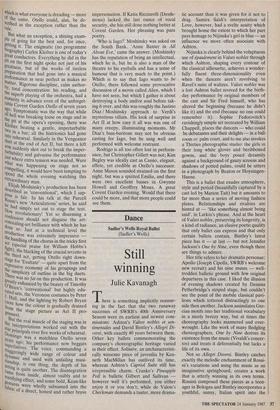Opera Otello (Covent Garden)
Wagon train
Rodney Milnes
It is not easy to write about the Royal Opera's new Otello without reference to its background. The company is at present the subject of intense public, critical and arts- administrative scrutiny: no subsidy for 1987-88 announced, with the very real threat of none at all, an eventuality that some say could be the organisation's salva- tion; a series of dismal revivals so far this season that have highlighted the uncertaintY of artistic direction, if not the impossibility of operating as an 'international' house in competition with those who are properly subsidised; the most unfortunate hiatus occasioned by the search for both a new chairman and general administrator on the eve, operatically speaking, of the houses closure for refurbishment in 1990, which has excited much interesting speculation (will so-and-so agree to be chairman with- out a guarantee of realistic subsidy, and will he — or, as the case may be, she — insist on his nominee as administrator; even the desirability of `international' opera has been called into question. In these circumstances, the first night of Otello could not but be a media event, with Mrs Thatcher, suddenly insisting that she loves opera, seen swapping sweet nothings with Placido Domingo back-stage on inde- pendent television news.
In this wagon-train-and-Indians situa- tion, the last thing the management needs is to be told by the Sunday Times how to make untold millions out of selling ROI4 silver roses; what it does need, and has got, is a clear demonstration of what 'interna- tional' opera can and should be: this Otello is the sort of performance that we shall all be boring our grandchildren to death about for years to come, and Covent Garden is the only organisation in this country that could have mounted it. The simple ques- tion for the newly opera-loving Mrs T is whether London is to remain a Europeall capital city that can afford to mount such performances, or whether it is to be reduced to the level of, say Oslo, which cannot. Whatever the answer, new riches or (more likely) the same old penny' pinching, it should not detract attention from the need for a radical shake-UP in management and artistic policy in Bow Street. That is what the board should be seeking from its new administrator, not -- which is what everyone is dreading — more of the same. Otello could, alas, be de- scribed as the exception rather than the rule.
But what an exception, a shining exam- Pie of going for the best and, for once, getting it. The enigmatic (no programme biography) Carlos Kleiber is one of today's great conductors. Everything he did in the Pit on the first night spoke not just of his greatness, but of the weeks of tireless Preparation that had gone into a musical Performance as near perfect as makes no matter. Rigorous discipline, calm author- itY, total concentration: his reading, and the superb playing of the orchestra, had a Maturity in advance even of the unforget- table Covent Garden Otello of seven years ago. Symptomatic was the way that while all hell was breaking loose on stage and in the pit at the opera's opening, there was Kleiber beating a gentle, imperturbable two in a bar; all the histrionics had gone into rehearsal. Similarly in the Vengeance duet at the end of Act H, but there a left arm suddenly shot out to break the imper- turbability and galvanise the performance just where extra tension was needed. Were what was happening on stage not so compelling, it would have been tempting to spend the whole evening watching this extraordinary man. Elijah Moshinsky's production has been described as 'conventional', which I sup- Pose is fair. In his talk at the Purcell Room's new 'Articulations' series, he said had simply set out to stage the text. How revolutionary! Yet so disarming a confession should not disguise the art- onein-artbrilliance with whch he has al so.g b Just ato a tchnical i level the Production was extremely impressive the handling of the chorus in the tricky first act (special praise for William Hobbs's fight), the blacking of the crucial terzetto in the third act, getting Otello right down- stage for 'Esultate' — quite apart from the expressive economy of his groupings and simplicity of outline in the big duets. "ere was no fat on this production. It was greatly enhanced by the beauty of Timothy u Brien's 'conventional' but highly edu- cated sets, the Veronese costumes by Peter Hall, and the lighting by Robert Bryan (note how the colour is gradually drained from the stage picture as Act II pro- gresses). But the real muscle of the staging was in the interpretations worked out with the star Principals over five weeks of rehearsal. Domingo was a matchless Otello seven 'ears ago; his performance now beggars superlatives. The voice, commanding a "itaggeringly wide range of colour and "Piamic and used with unfailing musi- a"ship, is one thing; the depth of his eting is quite another. The disintegration came from inside, almost visibly and to scarifying effect, and some bold, Kean-like fabric were wholly subsumed into the of a direct, honest and rather brave impersonation. If Katia Ricciarelli (Desde- mona) lacked the last ounce of vocal security, she has still done nothing better at Covent Garden. Her phrasing was pure poetry. `Who is Iago?' Moshinsky was asked on the South Bank. 'Anne Baxter in All About Eve,' came the answer. (Moshinsky has the reputation of being an intellectual, which he is, but he is also a man of the theatre to his eyeballs and has a sense of humour that is very much to the point.) Which is to say that Iago wants to be Otello; there followed some provocative discussion of a movie called Alien, which I have not seen, but which I gather is about destroying a body and/or soul before tak- ing it over, and this was roughly the Justino Diaz / Moshinsky approach to Verdi's mysterious villain. His look of surprise in Act II at how easy it all was was one of many creepy, illuminating moments. Mr Diaz's bass-baritone may not be obvious casting for Iago, but he sang well and performed with welcome restraint.
Rodrigo is all too often lost in perform- ance, but Christopher Gillett was not; Kim Begley was ideally cast as Cassio, elegant, effete, yet credible as Otello's successor. Anne Mason sounded strained on the first night, but was a spirited Emilia, and there were two excellent basses in Gwynne Howell and Geoffrey Moses. A great Covent Garden evening. Would that there could be more, and that more people could see them.



















































 Previous page
Previous page